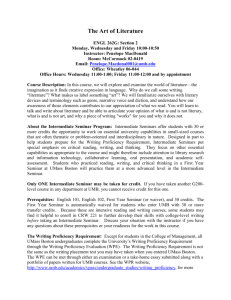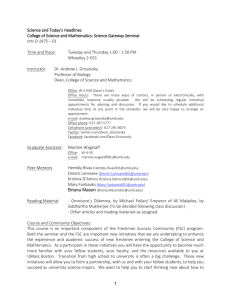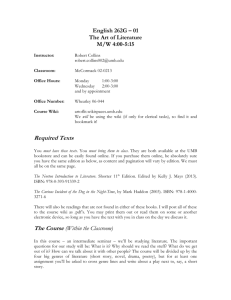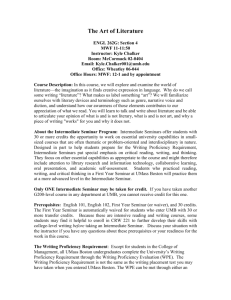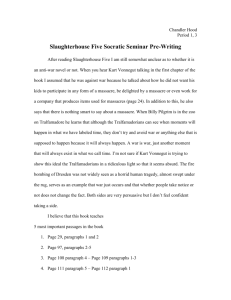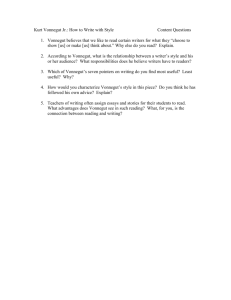The Art of Fiction ENGL 273G:02 Fall 2012
advertisement
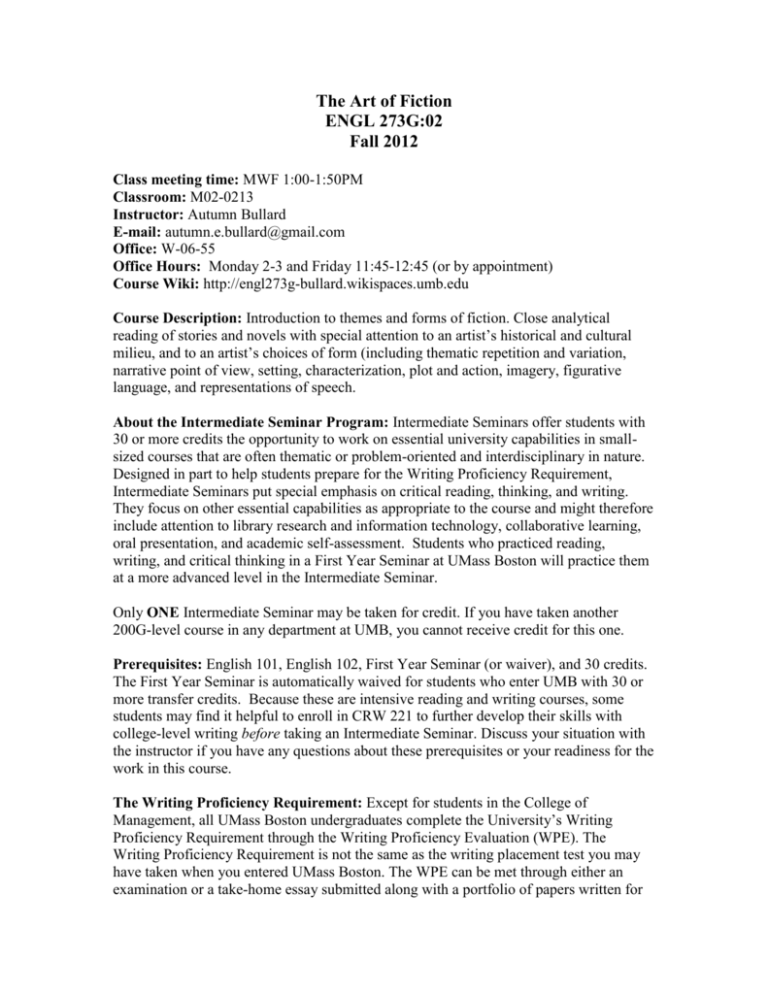
The Art of Fiction ENGL 273G:02 Fall 2012 Class meeting time: MWF 1:00-1:50PM Classroom: M02-0213 Instructor: Autumn Bullard E-mail: autumn.e.bullard@gmail.com Office: W-06-55 Office Hours: Monday 2-3 and Friday 11:45-12:45 (or by appointment) Course Wiki: http://engl273g-bullard.wikispaces.umb.edu Course Description: Introduction to themes and forms of fiction. Close analytical reading of stories and novels with special attention to an artist’s historical and cultural milieu, and to an artist’s choices of form (including thematic repetition and variation, narrative point of view, setting, characterization, plot and action, imagery, figurative language, and representations of speech. About the Intermediate Seminar Program: Intermediate Seminars offer students with 30 or more credits the opportunity to work on essential university capabilities in smallsized courses that are often thematic or problem-oriented and interdisciplinary in nature. Designed in part to help students prepare for the Writing Proficiency Requirement, Intermediate Seminars put special emphasis on critical reading, thinking, and writing. They focus on other essential capabilities as appropriate to the course and might therefore include attention to library research and information technology, collaborative learning, oral presentation, and academic self-assessment. Students who practiced reading, writing, and critical thinking in a First Year Seminar at UMass Boston will practice them at a more advanced level in the Intermediate Seminar. Only ONE Intermediate Seminar may be taken for credit. If you have taken another 200G-level course in any department at UMB, you cannot receive credit for this one. Prerequisites: English 101, English 102, First Year Seminar (or waiver), and 30 credits. The First Year Seminar is automatically waived for students who enter UMB with 30 or more transfer credits. Because these are intensive reading and writing courses, some students may find it helpful to enroll in CRW 221 to further develop their skills with college-level writing before taking an Intermediate Seminar. Discuss your situation with the instructor if you have any questions about these prerequisites or your readiness for the work in this course. The Writing Proficiency Requirement: Except for students in the College of Management, all UMass Boston undergraduates complete the University’s Writing Proficiency Requirement through the Writing Proficiency Evaluation (WPE). The Writing Proficiency Requirement is not the same as the writing placement test you may have taken when you entered UMass Boston. The WPE can be met through either an examination or a take-home essay submitted along with a portfolio of papers written for UMB courses. See the WPR website http://www.umb.edu/academics/vpass/undergraduate_studies/writing_proficiency for more details about the exam and portfolio options and dates. Students who have not already satisfied the WPR should arrange to take the exam or submit a portfolio shortly after completing this course. Support services for Intermediate Seminar students: The Academic Support Office offers both individual tutoring and drop-in workshops for students who need help with the critical reading, thinking and writing skills necessary for success in General Education courses such as this one. More information is available online (http://www.umb.edu/academics/vpass/academic_support/tutoring/rwssc) or at their Campus Center office (CC1-1300). The Ross Center for Disability Services (CCUL0211) provides accommodations and educational resources for students with demonstrated needs, as outlined on their website (http://www.umb.edu/academics/vpass/disability/ ). Should you be eligible for these services, you should contact the Ross Center right away so that their staff can help you identify appropriate accommodations in this and other courses. Finally, if it appears that you might not pass this Intermediate Seminar and if the instructor cannot figure out how to support your success in the course, the instructor might inform one of the University advisers working with the Student Referral Program. This strictly confidential program is part of an early warning system designed to help students address personal and academic difficulties that may interfere with their progress in the University. Assessment of these courses: In addition to course evaluation forms that are routinely administered at the end of each course at UMass Boston, Intermediate Seminar students are asked to complete a self-assessment questionnaire addressing their progress as critical thinkers and writers. Additionally, each term an assessment committee will look at randomly chosen student writing from a small sample of Intermediate Seminars. Please save all your writing in this course so that, if you are chosen, you will have your work available. The purpose of this evaluation is to improve the program and to improve particular courses as necessary, not to evaluate individual students. You may remove your name from your papers if you prefer to submit them anonymously. Student plagiarism and classroom behavior: Students are expected to abide by the University’s Code of Student Conduct in all their classes at UMass Boston (http://www.umb.edu/life_on_campus/policies/code/). Plagiarism is a particularly serious violation, as outlined in the Academic Honesty section of the code (section VI), and will not be tolerated in this class. In addition to the specific violations of student conduct itemized in section VII of the code, we urge all students to be mindful of broad standards of civility. Offensive and insulting behavior undermines the sense of community that the Intermediate Seminars strive to build. Class discussion and group projects can be productive only in a climate of respect for the opinions and beliefs of all. A healthy exchange about issues may include disagreement about ideas, but it must not demean the character or background of the individuals holding those ideas. Required Texts: For classroom purposes, you must have the exact edition that is in the bookstore. If you purchase your books online, make sure that your editions of the books have the same ISBNs as those listed below. Kennedy, X.J., and Dana Gioia, eds. An Introduction to Fiction. New York: Longman, 2010. [ISBN: 0205687881] Spiegelman, Art. Maus I: A Survivor's Tale: My Father Bleeds History. New York: Pantheon, 1986. [ISBN: 0394747232] ---. Maus II: A Survivor's Tale: And Here My Troubles Began. New York: Pantheon, 1992. [ISBN: 0679729771] Vonnegut, Kurt. Slaughterhouse-Five: A Novel. New York: Random House, 1999. [ISBN: 0385333846] [Unless you require an assisted learning device, please refrain from using ebooks, kindles, nooks, or tablets in this course. In addition, you MUST print out all PDFs and come to class with the text(s) carefully read and notes made in detail (this includes highlighting and underlining important portions of text, asking questions about the text in the margins, etc.); marginalia or annotations are a necessity in both books and PDFs, as marking up your texts allows you to develop and document your thinking and learning. That said, I will periodically ask to look at your books and print-outs in order to check that you are actively engaging with the course materials. This also allows to me see that you are keeping up with the assigned reading. This form of note-taking will count toward your participation grade.] Note: All PDFs will be available on the course wiki page unless otherwise specified. Course Grade Determination: Paper 1: 10% Paper 2 (including workshop draft) 20% Paper 3 (including workshop and rough draft): 25% Final presentation: 15% Weekly Assignments: 20% Participation/Attendance: 10% E-mail: I will use WISER periodically to send out class information and documents. Make sure that you frequently check your UMB e-mail account or that you have your messages forwarded from your UMB account to the email account that you use regularly. You are responsible for remaining apprised of class developments and making sure that you have all necessary course materials. Attendance: Attending class, bringing the course materials and arriving on time is crucial to your success in this course and to the success of the course in general. At the beginning of each class each student will be expected to have all their day’s materials out on their desk. This is a function of my role taking; if you fail to bring your materials to class you will be counted as absent. Although e-mails containing status updates are appreciated, they do not result in excused absences. Missing more than six classes will result in a failing grade; do not expect to pass the course with more than six absences. Two “tardies” will count as one absence. Any student who misses more than six classes by the November 8 withdrawal deadline will be advised to drop the course. [Note on punctuality: Class starts promptly at 1 P.M. The classroom door will remain open until 1:10 P.M. If you arrive to the classroom later than 1:10 P.M., please do not enter the room, as late entrances are disruptive. Instead, please either wait outside the room until the door opens at 1:50P.M., or come to my next session of office hours. If you do not remain after class, you are responsible to contact a fellow student to find out what your missed. Absence from class is not a permissible excuse for tardy work. Participation: Literature courses are discussion-heavy and, as such, rely on your sharing your thoughts, ideas, and interpretations of the course materials. Come to class prepared by reading the assigned materials and completing any written assignments by the dates next to which they are listed on the class schedule. Participation is more than just speaking up in class. I will also be evaluating your active note taking (both within your course materials and during class discussions), involvement in group activities, and engagement with in-class writing assignments. Daily Writing Assignments (“Notes and Quotes”): “Notes and Quotes” are written responses to the reading that you will complete in preparation for and bring with you to each class. From each assigned reading, you will pick a quote that stands out to you and write at least 200-250 words discussing its singular importance to the text. Often, I will prompt you to look for a quote that best embodies a particular element of fiction. These “topics” will be announced in class. The purpose of these assignments is to ensure that students keep up with the reading and to stimulate thought for class discussion. Therefore, these mini-assignments will be tied into your “weekly assignments grade” (worth 15 percent of your final grade). I will monitor your participation in this course in part by checking that you come to class with your Notes and Quotes typed and ready to share and by collecting them occasionally for grading. This assignment will be graded as exemplary (check plus), satisfactory (check), or unsatisfactory (check minus). Please save all of your Notes and Quotes, as they might help you formulate ideas for longer papers. Submission of Assignments: All assignments are due at the beginning of class unless otherwise noted. A paper received after class (at 1:50 P.M. on the day it is due or later) is considered late and will be marked down one full letter grade. For each day a paper is past its due date, your paper grade will be lowered by one full letter grade. If you know in advance you will be absent, EARLY paper submissions will be accepted either in person or in my mailbox. Electronic copies of papers will not be accepted at any time. Formal Papers: In addition to Notes and Quotes, your formal papers are the best way to demonstrate what you have learned about literature and to showcase your ability to express your thoughts clearly and cohesively through written language. There will be required to complete three papers, in addition to a final project and presentation, and all of these assignments, combined, make up more than one half of your final course grade. Final Project and Presentation: The final project and presentation will allow you to creatively demonstrate your individual understanding of literature and literary studies and will be worth 15% of your final course grade. As we approach the end of the semester, I will provide you with a handout that discusses in detail the project and presentation requirements. Disabilities: If you have a disability and need accommodations in order to complete course requirements, please contact the Ross Center for Disability Services at 617.287.7430 (CC-2-2010). How to succeed in this course: Complete all assigned work on time and come to class ready to actively participate! A final note on the Intermediate Seminar: Dr. Cheryl Nixon, English Department Chair, supervises the Intermediate Seminars. Please expect occasional visits from Dr. Nixon, as well as from other Intermediate Seminar instructors. UNIT ONE The SHORT STORY, SHORT PLAY and the ELEMENTS OF FICTION How do you tell a story? Week One: W, September 5 F, September 7 Week Two: M, September 10 Syllabus and Course Overview Close Reading: Microfiction/Flashfiction Ch. 1 “Reading a Story” [p. 5-16] Grimm, “Godfather Death” [11-12] Updike, “A & P” [p. 16-20] Ch. 3 “Character” [p. 77-79] Carver, “Cathedral” [p. 93-104] Walker, “Everyday Use” [p. 445-461] ADD/DROP ENDS *You must have joined the wiki by this date W, September 12 Morrison, “Recitatif” [PDF on wiki] Kincaid, “Girl” [p. 543-545] F, September 14 Ch. 2 “Point of View” [p. 25-29] Faulkner, “A Rose for Emily” [p. 29-36] Gilman, “The Yellow Wallpaper” [p. 436-446] Gilman, “Why I Wrote the Yellow Wallpaper” [p. 447-448] Week Three: M, September 17 PAPER #1 DUE Poe, “The Telltale Heart” [In class] W, September 19 Paper #2 Assigned Ch. 6 “Theme” [p. 183-185] Vonnegut, “Harrison Bergeron” [p. 215-219] Ellison, “Battle Royale” [p. 519-539] F, September 21 Munro, “How I Met My Husband” [p. 202-214] Week Four: M, September 24 Ch. 4 “Setting” [p. 107-110] Joyce, “The Dead” [PDF on wiki] W, September 26 Ch. 7 “Symbol” [p. 223-225] Jackson, “The Lottery” [p. 247- 255] Gilbert “Michiko Dead” Chasin, “The Word Plum” F, September O’Brien, “The Things They Carried” [PDF on wiki] Crane, “The Blue Hotel” [PDF on wiki] 28 Week Five: M, October 1 Workshop 1 W, October 3 Workshop 2 F, October 5 Paper 2 Due Week Six: M, October 8 Columbus Day No Class W, October 10 “The Lieutenant of Inishmore” [PDF on wiki] F, October 12 Week Seven: M, October 15 “The Lieutenant of Inishmore” [PDF on wiki] Background of the Bombing of Dresden, WWII O’Brien, How To Tell A True War Story [PDF on wiki] Tues, Oct: 16 Vonnegut, Slaughterhouse Five Ch. 1 [p. 1-28] Thurs, Oct: 18 Vonnegut, Slaughterhouse Five Ch. 2&3 [p. 29-90] M, October 22 Vonnegut, Slaughterhouse Five Ch. 4 [p. 91-109] W, October 24 Vonnegut, Slaughterhouse Five Ch. 5 [p. 110-172] F, October 26 Paper #3 Assigned Vonnegut, Slaughterhouse Five Ch. 6&7 [p. 173-205] Week Eight: Week Nine: M, October 29 W, October 31 W, November 2 Week Ten: Criticism Week M, November 5 W, November 7 Vonnegut, Slaughterhouse Five Ch. 8 [p. 206-232] Vonnegut, Slaughterhouse Five Ch. 9&10 [233-275] Novel Wrap Up Matheson, “‘This Lousy Little Book’: The Genesis and Development of Slaughterhouse 5 as Revealed in Chapter One” [PDF on wiki] Rigney, “All This Happened, More or Less, What a Novelist Made of the Bombing of Dresden” [PDF on wiki] ************* November 8 Withdrawal and Pass/Fail Deadline************** F, November 9 Plato, Phaedrus [PDF] Week Eleven: Workshop Week M, November 12 Veteran’s Day No Class W, November 14 Paper Workshop Day 1 F, November 16 Paper Workshop Day 2 Week Twelve: M, November 19 Paper 3 Due McCloud, Understanding Comics Ch. 2&6 [in class] Graphic text close-reading exercise W, November 21 Thanksgiving Break No Class F, November Thanksgiving Break No Class 23 UNIT THREE VISUAL/GRAPHIC TEXT and CREATIVITY What are today’s forms of storytelling? Week Thirteen: M, November 26 Final Project and Presentation Assigned Spiegelman, Maus I Ch. 1-3 W, November 28 Spiegelman, Maus I Ch. 4-6 F, November Spiegelman, Maus II Ch. 1&2 30 Week Fourteen: M, December 3 Spiegelman, Maus II Ch. 3-5 W, December 5 Final Presentations F, December Final Presentations 7 Week Fifteen: M, December 10 W, December 12 (Dec. 14-20: Final Exam Period) Final Presentations Course Evaluations Course Wrap Up
